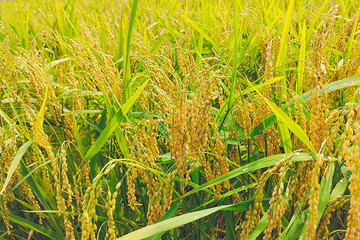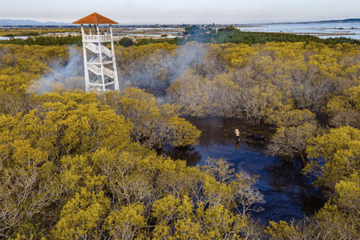- © Copyright of Vietnamnet Global.
- Tel: 024 3772 7988 Fax: (024) 37722734
- Email: [email protected]
carbon credits
Update news carbon credits
Vietnam exports $5.75 billion in rice, leads in low-emission production
Vietnam’s record-setting rice exports in 2024 highlight the success of its sustainable farming initiatives, with Minister Le Minh Hoan underscoring the significant potential of the carbon credit market.
Rice farmers see high profits from low-carbon cultivation, carbon credit sales
Farmers can pocket VND18 million more in profit from each hectare of low-emission rice compared with traditional cultivation methods, as well as collect money from carbon credit sales.
If carbon market starts late, Vietnamese businesses will be at a disadvantage
The price of one carbon credit for one ton of steel is now hovering around 80-100 euros. The figure is expected to reach 300 euros by 2030. This would affect hundreds of enterprises in Vietnam.
Mekong Delta farmers set to receive $40 million in carbon credit payments
Farmers in the Mekong Delta will receive close to 1,000 billion VND ($40 million) from the carbon credit program tied to Vietnam's 1-million-hectare high-quality rice project, with funding support from the Transformative Carbon Asset Facility.
VN to exploit seaweed reserves, a giant carbon reservoir
Vietnam’s total seaweed cultivation area, which is about 1 million hectares, is considered a vast new natural resource. People not only use seaweed to make medicines and food, but can also sell carbon credits at high prices.
Tapping potential to sell seaweed-based carbon credits
Just as the forestry sector has tapped into the carbon credit market, the aquaculture sector, particularly seaweed farming, is emerging as a promising avenue with the potential to store up to 1,500 tonnes of greenhouse gas per square kilometre.
Vietnamese province is first to earn money from 'low-emission rice'
Mekong Delta farmers have harvested rice from the first crops produced with a low-emission cultivation model, while Dak Lak province has become the first province in Vietnam to sell reduced carbon from rice.
MARD seeks to transfer 6 million tons of CO2 to keep prices stable
The Ministry of Agriculture and Rural Development (MARD) has submitted a report to the Prime Minister for the authority to transfer 6 million tons of CO2 in the north central region created in the 2018-19 period.
Vietnam to sell 5 million more carbon credits in 2024-2025 period
A workshop titled ‘Carbon credits and human resources for carbon credit market’ was held on August 16, 2024.
VN active in EU Deforestation Regulation implementation
Tran Quang Bao, director of the Forestry Department under the Ministry of Agriculture and Rural Development, talks about Vietnam's preparedness for the EU Deforestation Regulation.
VNFOREST: Negotiations on agreements on forest carbon credit sales continue
Many localities in Vietnam that want to sell forest carbon credits are awaiting guidance on the sales.
Farmers expect additional income from 'low-emission' rice cultivation
A Thai company has agreed to buy carbon credits from rice farmers in Dak Lak province at $20 per credit, which is double the price paid by the World Bank under the "1 million hectare high-quality rice" program in Mekong Delta.
Farmers expand cashew tree cultivation for more carbon-credit sales
One cashew tree can absorb 400 kilograms of carbon, while one hectare of cashew low-carbon growing area can bring $400 from carbon credit sales.
Quang Tri earns money from carbon credits: dream turns into reality
Hot and dry westerly winds and burning were once big fears of QuangTri province residents, but now they have been turned into great advantages that will enable green growth.
Electric taxi firms can make money from carbon credit sales
A panel discussion on using electric vehicles (EVs) for taxi services in Vietnam was held late last week, where participants urged to speed up the shift to electric taxis.
Coconut garden can yield $25,000 from carbon credit sale
Selling carbon credits is no longer far-fetched for Vietnam. The country earned trillions of dong from selling carbon credits in late 2023.
Livestock group opposes requirement on greenhouse-gas emissions inventory
Since livestock farming faces more difficulties than other business fields, adding livestock farms to the list of facilities subject to greenhouse gas emission inventories is not feasible, livestock industry leaders said.
Vietnamese businesses have more opportunities to join carbon markets
To encourage businesses to develop green, the Ho Chi Minh City Union of Business Association (HUBA) and SGGP Newspaper jointly implemented a program so that Vietnamese businesses have more opportunities to join carbon markets.
Mekong Delta farmers cultivating rice as part of VnSAT project
Under the Vietnam Sustainable Agriculture Transformation Project (VnSAT), Mekong Delta farmers are developing high-quality low-emission rice and sell carbon credits.
Mangrove forests can yield high volume of blue carbon credits
One hectare of mangrove forest has a carbon absorption capability five times higher than one hectare of terrestrial forests. This is an important source of blue carbon credits, a high-end, very valuable product from nature.



















